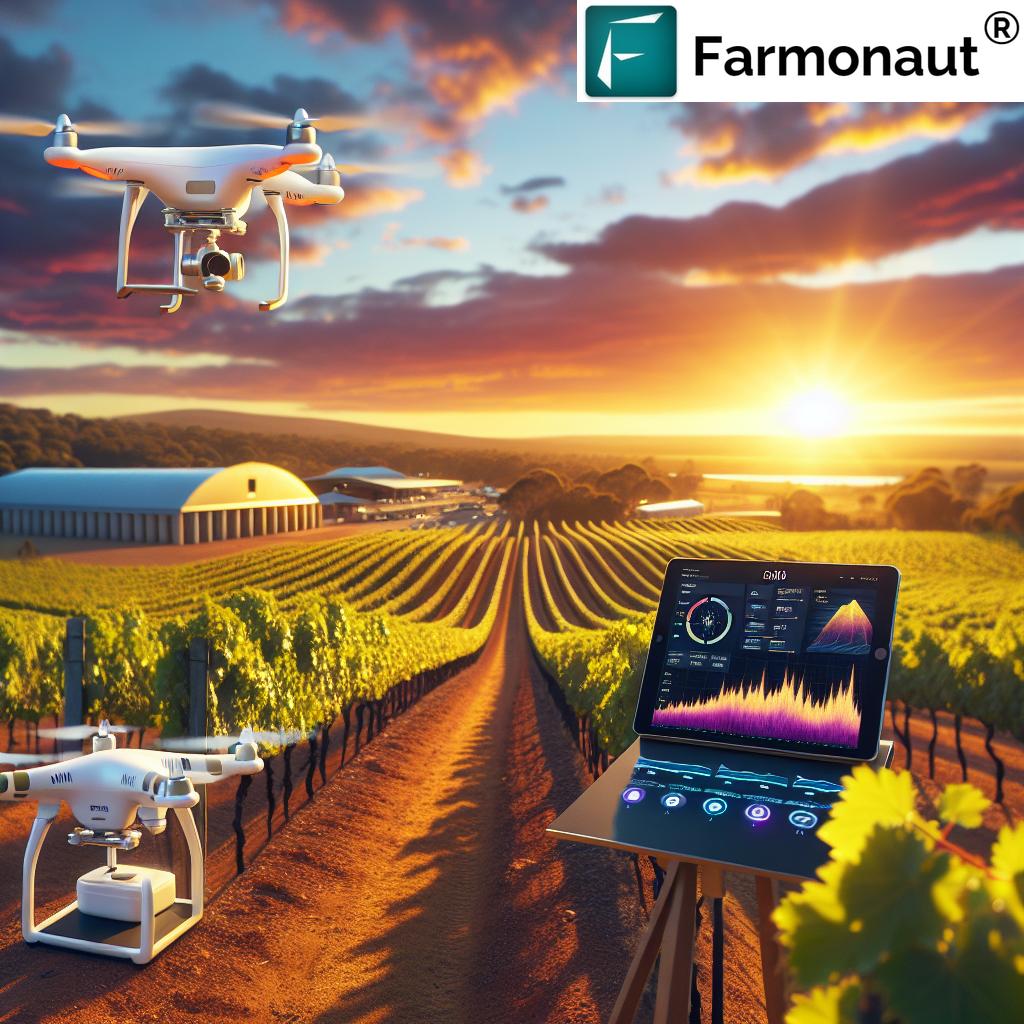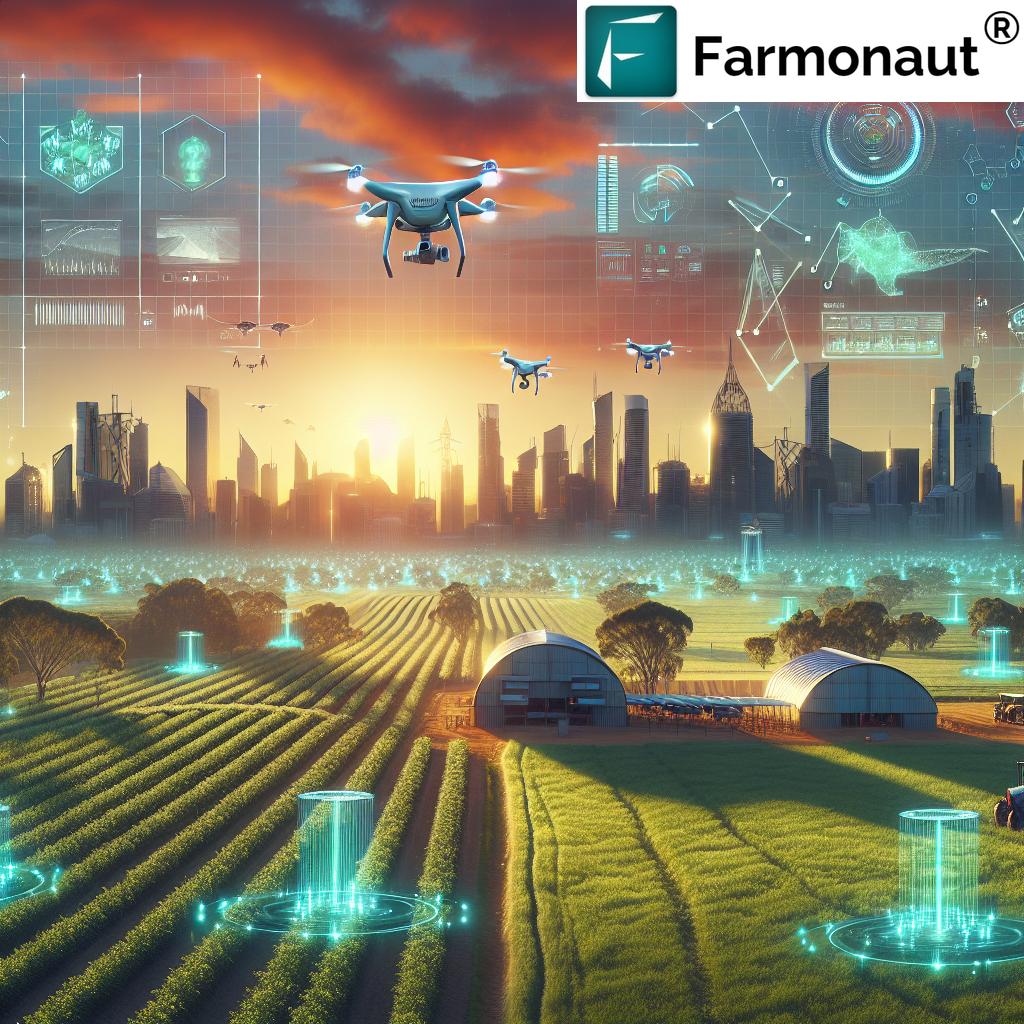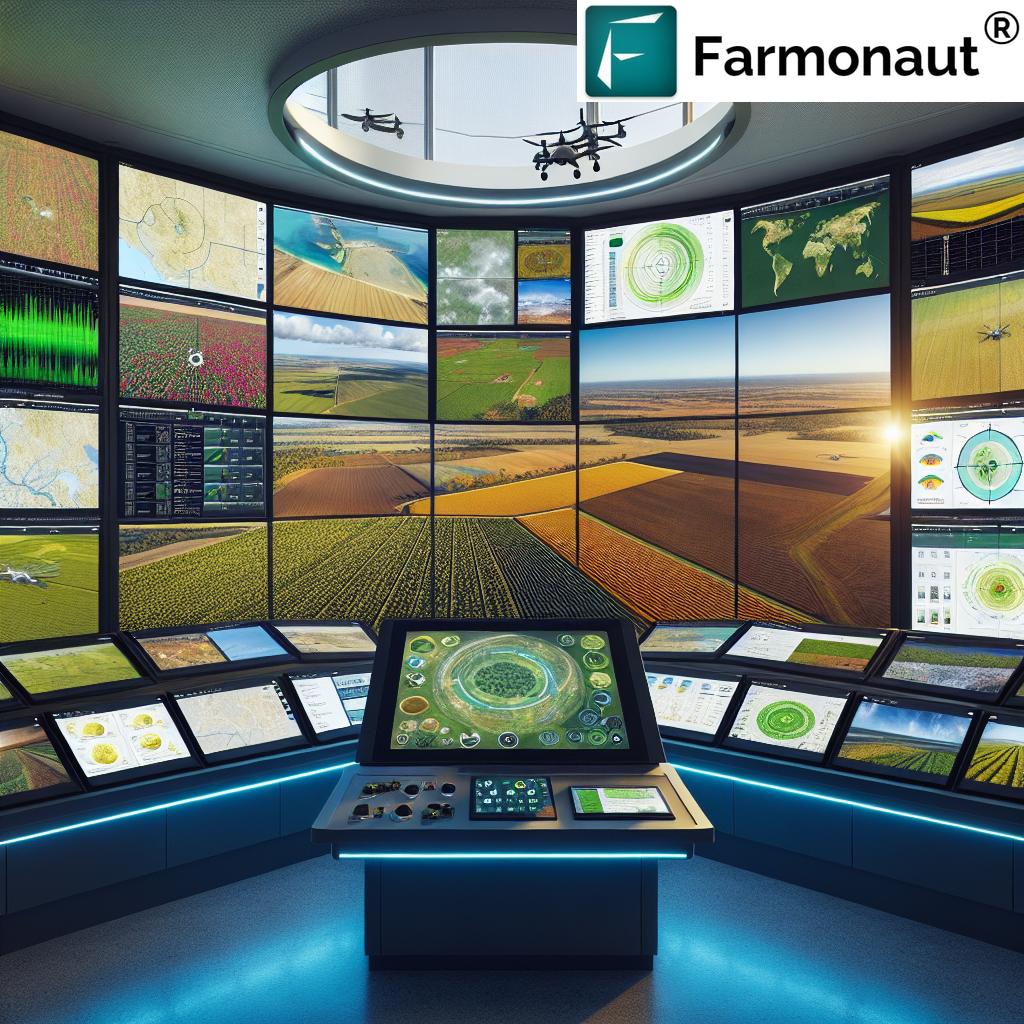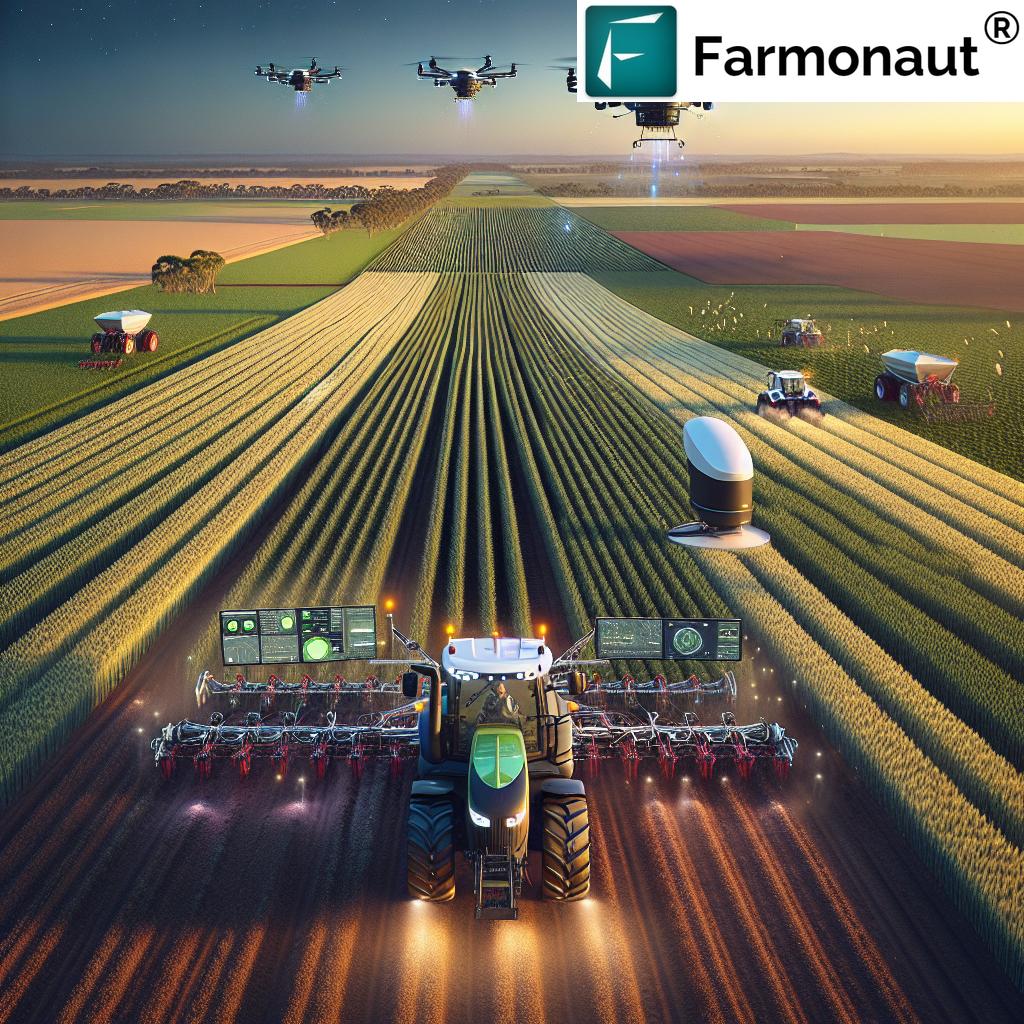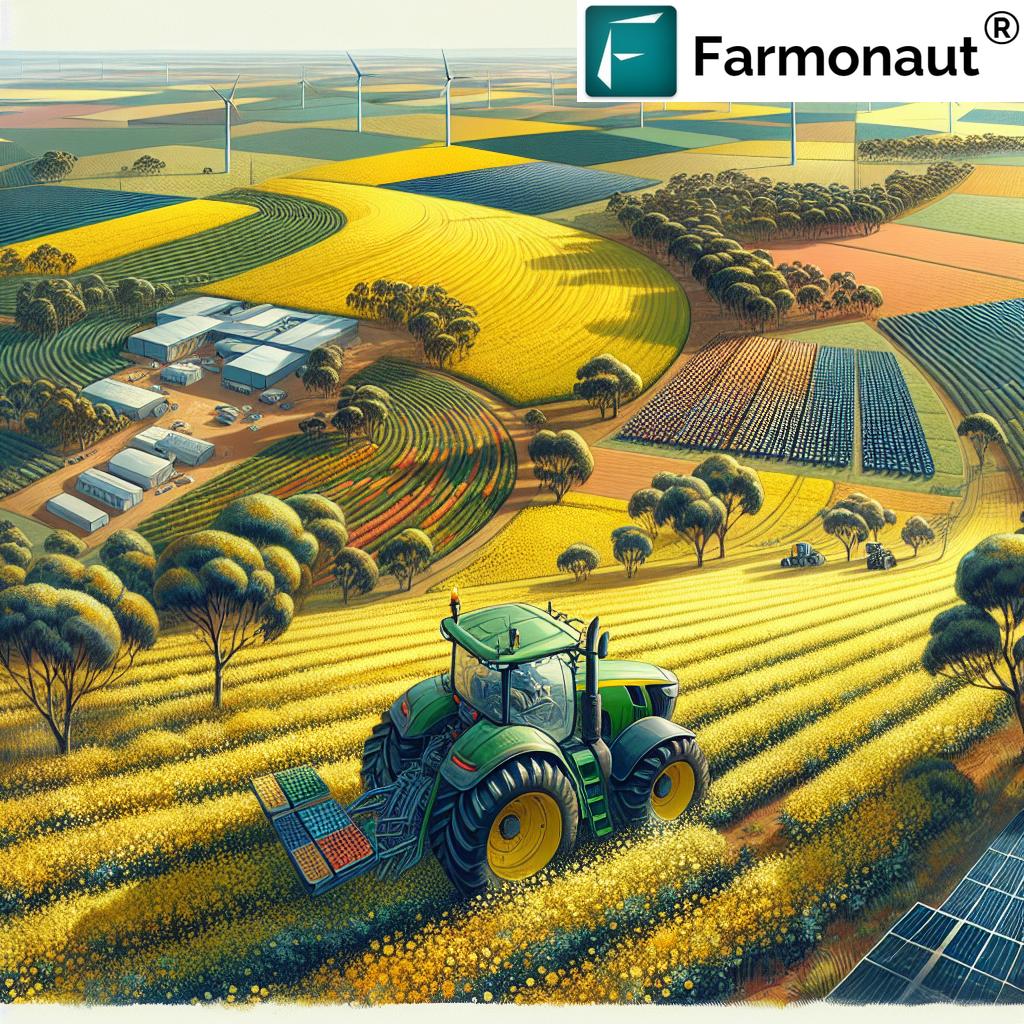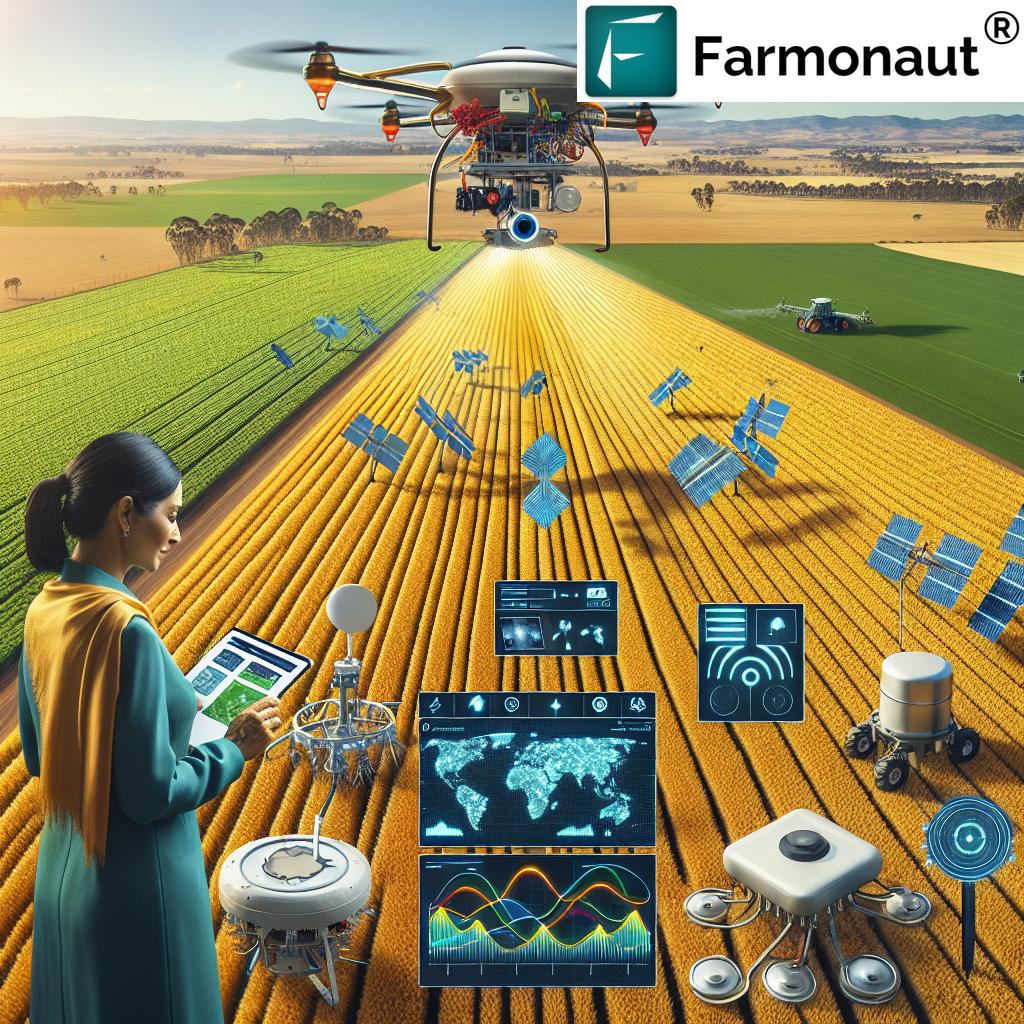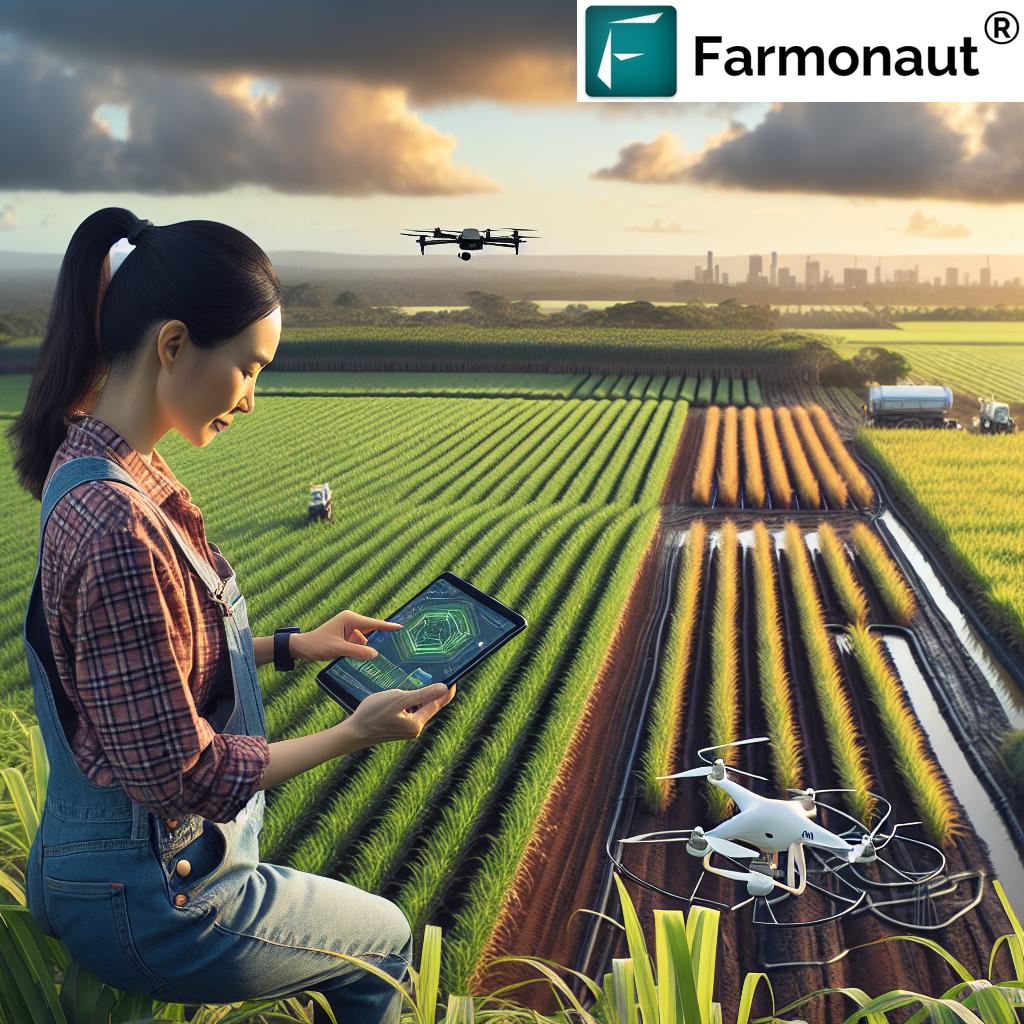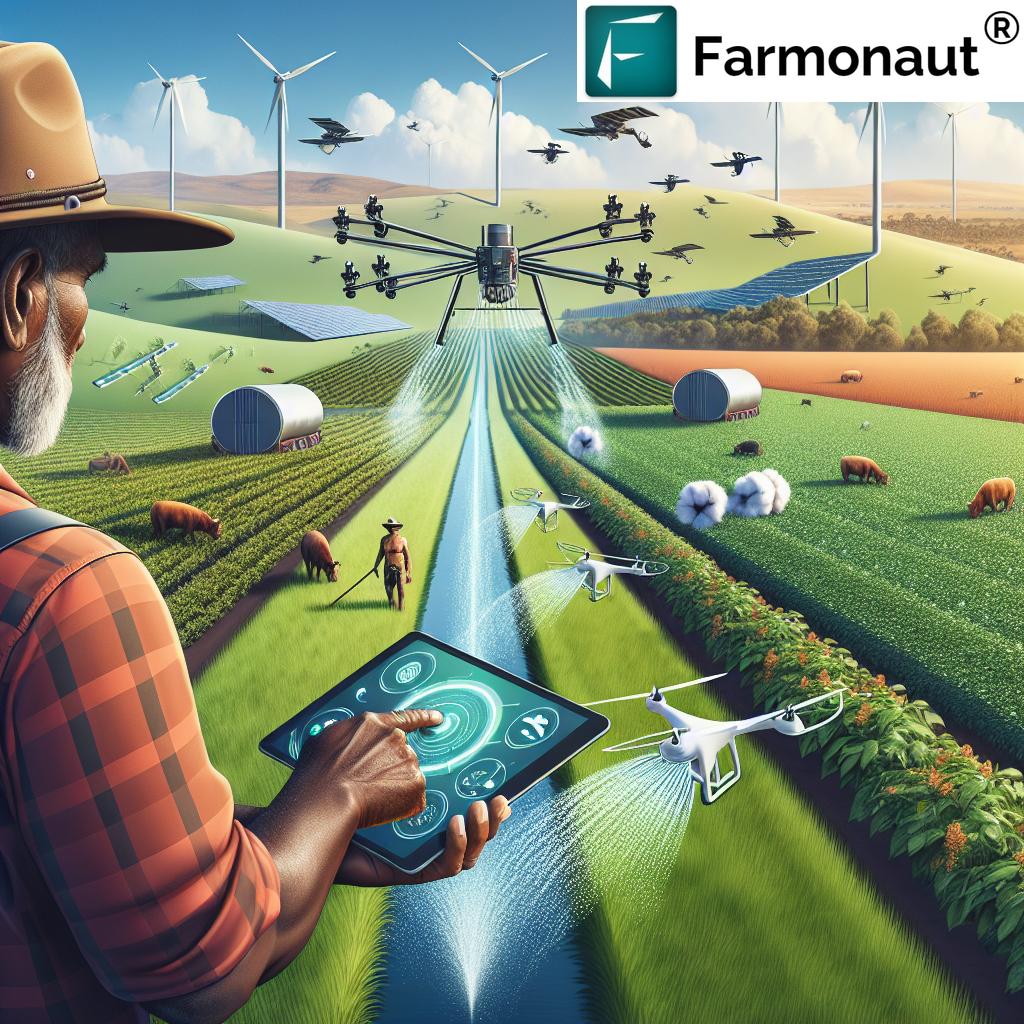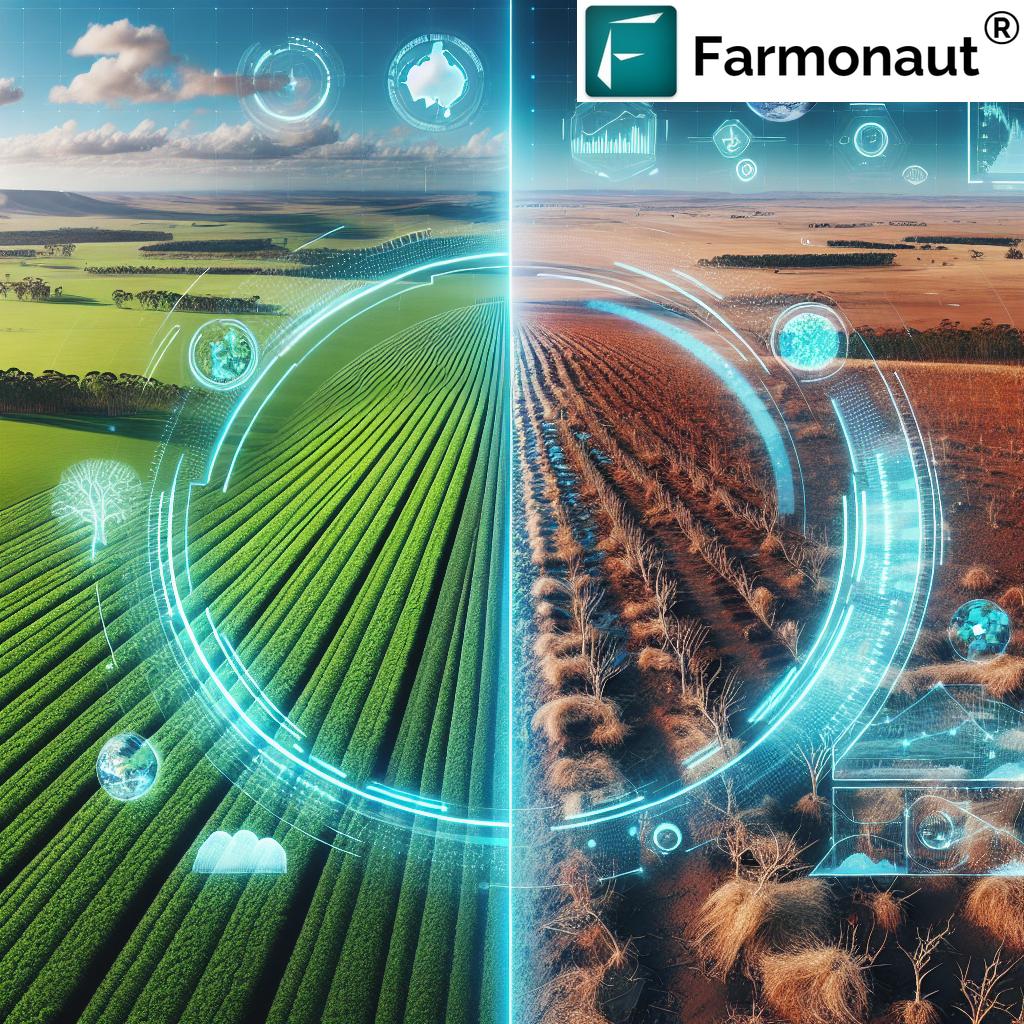Revolutionizing South Australian Aquaculture: Smart Farming Solutions and Sustainable Practices for Economic Growth
“South Australia’s aquaculture industry contributes over $200 million annually to the state’s economy, focusing on abalone, tuna, and oysters.“
Welcome to our comprehensive exploration of South Australia’s burgeoning aquaculture industry and the innovative technologies transforming it. As we dive into the depths of this thriving sector, we’ll uncover the latest trends in sustainable aquaculture practices and precision agriculture technologies that are reshaping the region’s primary industries. Our journey will take us through the economic impact of key sectors like abalone, tuna, and oysters, while shedding light on the cutting-edge crop management software and smart farming solutions driving industry growth.
At Farmonaut, we’re at the forefront of this agricultural revolution, offering advanced satellite-based farm management solutions that are making precision agriculture accessible and affordable for farmers worldwide. Our platform integrates innovative technology with data-driven insights, providing real-time crop health monitoring, AI-based advisory systems, and resource management tools that are transforming traditional farming practices.
As we explore the landscape of South Australian aquaculture, we’ll delve into crucial topics such as agricultural biosecurity measures, digital farm management techniques, and the role of agricultural data analytics in enhancing productivity. We’ll also uncover exciting agtech investment opportunities and examine how technologies like remote sensing in agriculture and innovative irrigation systems are shaping the future of farming.
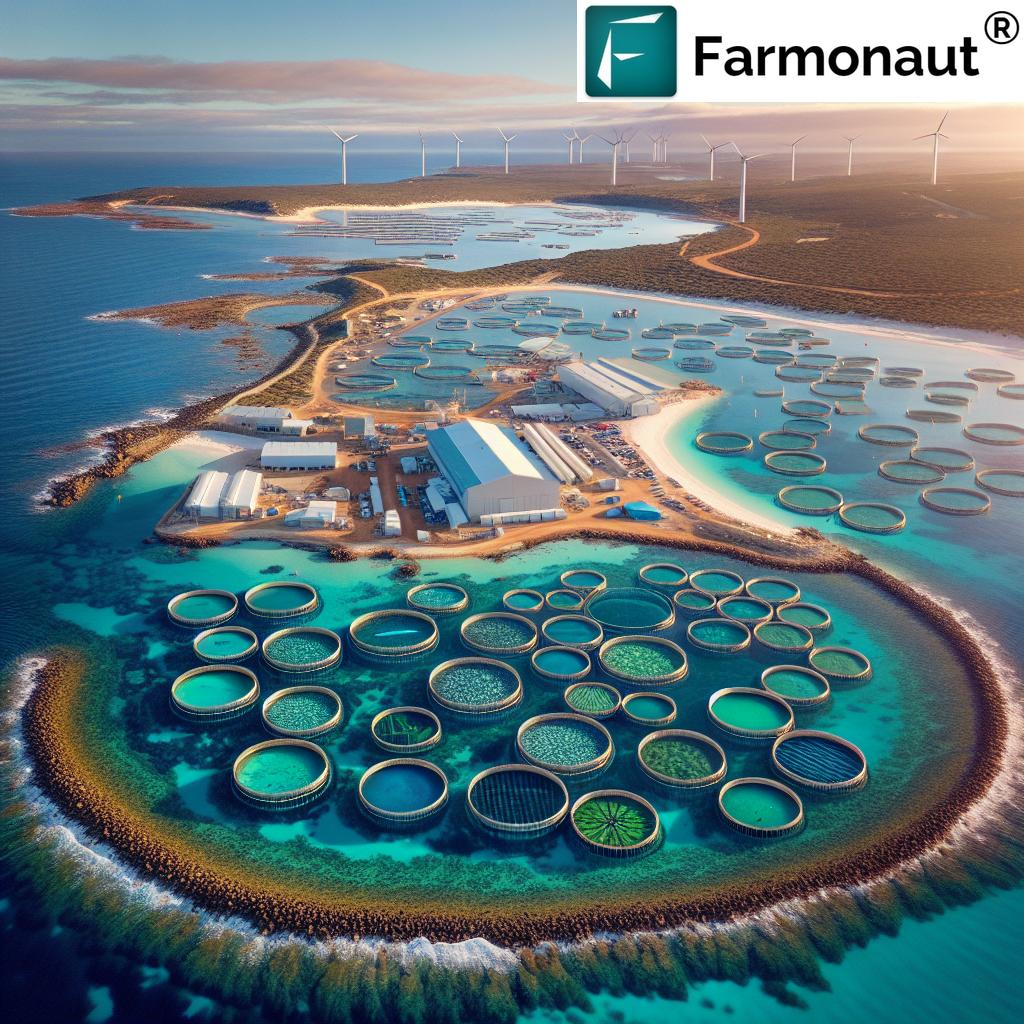
The Economic Impact of South Australian Aquaculture
South Australia’s aquaculture industry is a powerhouse of economic growth, contributing significantly to the state’s primary sector. Let’s break down the key components that make this industry a true economic driver:
- Diverse Sectors: The industry encompasses various sectors, including abalone, tuna, oysters, and other finfish species.
- Job Creation: Aquaculture provides employment opportunities in coastal and rural communities, supporting regional development.
- Export Revenue: High-quality seafood products from South Australia are in demand globally, generating substantial export revenue.
- Innovation Hub: The industry fosters innovation, attracting investment in research and development of sustainable practices.
To truly appreciate the scale and impact of South Australia’s aquaculture industry, let’s take a closer look at some of the key sectors:
| Sector | Economic Impact (Estimated Annual Revenue) | Sustainable Practices | Smart Farming Solutions |
|---|---|---|---|
| Abalone | $50 million | Recirculating aquaculture systems, waste management | AI-driven feeding systems, water quality monitoring |
| Tuna | $80 million | Quota management, selective breeding programs | Satellite tracking, underwater drones for monitoring |
| Oysters | $40 million | Integrated multi-trophic aquaculture, disease resistance breeding | IoT sensors for environmental monitoring, blockchain traceability |
| Other Finfish | $30 million | Aquaponics, sustainable feed development | Machine learning for growth prediction, automated sorting systems |
| Overall Industry | $200+ million | Ecosystem-based management, carbon footprint reduction | Big data analytics, precision aquaculture platforms |
This table illustrates the diverse and robust nature of South Australia’s aquaculture industry. Each sector not only contributes significantly to the economy but also embraces sustainable practices and innovative technologies to ensure long-term viability and growth.
Sustainable Aquaculture Practices: A Foundation for Growth
At the heart of South Australia’s aquaculture success lies a commitment to sustainability. We’re seeing a shift towards practices that not only boost productivity but also protect marine ecosystems. Here are some key sustainable aquaculture practices being implemented:
- Integrated Multi-Trophic Aquaculture (IMTA): This innovative approach combines the cultivation of different species that benefit from each other, reducing waste and improving water quality.
- Recirculating Aquaculture Systems (RAS): These closed-loop systems minimize water usage and environmental impact while maximizing production efficiency.
- Sustainable Feed Development: Research into alternative protein sources for aquafeed is reducing reliance on wild-caught fish and improving feed conversion ratios.
- Genetic Improvement Programs: Selective breeding for disease resistance and growth efficiency is enhancing stock quality while reducing the need for antibiotics.
These practices are not just environmentally responsible; they’re economically smart. By reducing inputs and improving outputs, South Australian aquaculture farms are seeing increased profitability alongside reduced ecological footprints.
Precision Agriculture Technologies in Aquaculture
“Agricultural data analytics can improve farm productivity by up to 20% through optimized decision-making and resource allocation.“
The integration of precision agriculture technologies in aquaculture is revolutionizing the industry. At Farmonaut, we’re proud to be at the forefront of this technological wave, offering solutions that empower farmers with data-driven insights. Here’s how precision technologies are making waves in South Australian aquaculture:
- Satellite-Based Monitoring: Our satellite imagery technology allows for real-time monitoring of aquaculture sites, tracking water quality, temperature, and algal blooms.
- IoT Sensors and Data Analytics: Networks of sensors provide continuous data on critical parameters, which our AI systems analyze to offer actionable insights.
- Automated Feeding Systems: Smart feeders adjust feed distribution based on real-time data, optimizing nutrition and reducing waste.
- Blockchain Traceability: Our blockchain solutions ensure transparency in the supply chain, from hatchery to plate, enhancing food safety and consumer trust.
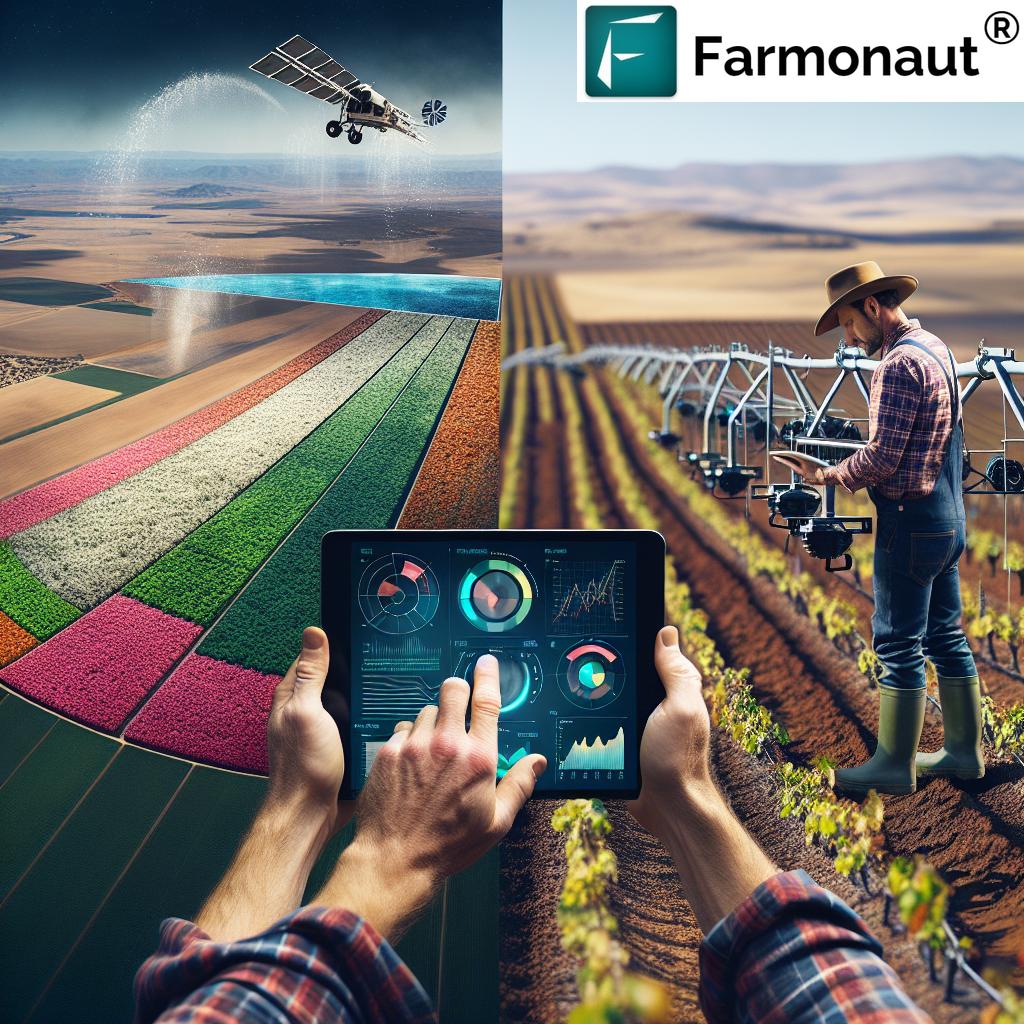
These technologies are not just improving efficiency; they’re transforming the way aquaculture farms operate. By providing real-time data and predictive analytics, we’re helping farmers make informed decisions that boost productivity while minimizing environmental impact.
Agricultural Biosecurity Measures: Safeguarding South Australia’s Aquatic Health
Biosecurity is paramount in maintaining the health and sustainability of South Australia’s aquaculture industry. Robust measures are in place to prevent, control, and manage diseases and pests that could threaten aquatic ecosystems and farm productivity. Key biosecurity initiatives include:
- Quarantine Protocols: Strict procedures for introducing new stock to prevent the spread of diseases.
- Disease Surveillance Programs: Regular monitoring and testing to detect and respond to potential outbreaks early.
- Best Practice Guidelines: Industry-wide standards for farm management, including hygiene and animal welfare.
- Emergency Response Plans: Coordinated strategies to quickly address and contain any biosecurity threats.
At Farmonaut, we support these efforts through our advanced monitoring systems, which can detect early signs of disease or environmental stress, allowing for rapid response and mitigation.
Crop Management Software and Smart Farming Solutions
While traditionally associated with land-based agriculture, crop management software and smart farming solutions are finding innovative applications in aquaculture. These digital tools are enhancing efficiency and sustainability across the industry:
- Growth Prediction Models: AI-driven software that forecasts growth rates and optimal harvest times.
- Environmental Control Systems: Automated systems that maintain optimal water conditions for aquatic species.
- Feed Management Platforms: Software that optimizes feeding schedules and quantities based on species, growth stage, and environmental factors.
- Inventory Tracking: Digital solutions for real-time stock management and traceability.
Farmonaut’s platform integrates seamlessly with these aquaculture-specific tools, providing a comprehensive management solution for farmers. Our satellite-based monitoring complements on-site sensors, offering a holistic view of farm operations.
Digital Farm Management: Streamlining Operations
Digital farm management is transforming aquaculture operations in South Australia. These comprehensive platforms integrate various aspects of farm management into a single, user-friendly interface. Key features include:
- Task Scheduling and Automation: Digital calendars and reminders for critical farm operations.
- Resource Allocation: Tools for optimizing labor, equipment, and supply usage.
- Compliance Management: Systems for tracking and ensuring adherence to regulatory requirements.
- Financial Planning: Integrated budgeting and forecasting tools for better financial management.
Farmonaut’s platform complements these digital farm management systems by providing crucial data on environmental conditions and crop health, enabling more informed decision-making across all aspects of farm operations.
AgTech Investment Opportunities in South Australian Aquaculture
The South Australian aquaculture sector is ripe with investment opportunities, particularly in AgTech solutions. Here are some key areas attracting investor interest:
- Underwater Drone Technology: For non-invasive monitoring of fish health and behavior.
- AI-Powered Disease Detection: Advanced imaging and machine learning for early disease identification.
- Sustainable Aquafeed Innovations: Development of eco-friendly, high-performance fish feeds.
- Offshore Aquaculture Systems: Technologies enabling safe and efficient deep-water farming.
These investment opportunities not only promise financial returns but also contribute to the sustainable growth of the industry. At Farmonaut, we’re excited to see how these innovations will integrate with our existing technologies to create even more powerful solutions for aquaculture farmers.
The Role of Agricultural Data Analytics in Decision-Making
Agricultural data analytics is revolutionizing decision-making processes in South Australian aquaculture. By harnessing the power of big data, farmers and industry leaders can make more informed, timely, and effective decisions. Here’s how data analytics is making a difference:
- Predictive Modeling: Forecasting market trends, environmental changes, and production outcomes.
- Risk Assessment: Identifying potential threats to crop health and implementing preemptive measures.
- Performance Optimization: Analyzing historical data to fine-tune farming practices for maximum efficiency.
- Market Intelligence: Providing insights into consumer preferences and emerging market opportunities.
Farmonaut’s platform plays a crucial role in this data-driven approach. Our satellite-based monitoring and AI-powered analytics provide farmers with actionable insights, enabling them to optimize their operations and increase profitability.
Remote Sensing in Agriculture: Applications in Aquaculture
Remote sensing technology, a cornerstone of Farmonaut’s offerings, is finding innovative applications in aquaculture. This technology provides valuable data on environmental conditions that impact aquatic farming:
- Water Quality Monitoring: Satellite imagery can detect changes in water color, indicating algal blooms or pollution.
- Temperature Mapping: Thermal sensors can track sea surface temperatures, crucial for species like tuna.
- Coastal Habitat Assessment: Remote sensing helps in monitoring the health of surrounding ecosystems, vital for sustainable aquaculture.
- Site Selection: Geospatial data aids in identifying optimal locations for new aquaculture operations.
By leveraging these remote sensing capabilities, South Australian aquaculture farms can make data-driven decisions that enhance productivity while minimizing environmental impact.
Innovative Irrigation Systems in Aquaculture
While traditionally associated with land-based agriculture, innovative irrigation systems are finding unique applications in aquaculture, particularly in land-based and recirculating aquaculture systems (RAS). These advanced irrigation technologies are enhancing water management and sustainability in the industry:
- Precision Water Delivery: Automated systems that deliver exact amounts of water based on species requirements and environmental conditions.
- Water Recycling Technology: Advanced filtration and treatment systems that allow for efficient water reuse, reducing overall consumption.
- Nutrient Management: Smart systems that monitor and adjust nutrient levels in water, optimizing growth conditions for aquatic species.
- Energy-Efficient Pumping: Solar-powered and variable-speed pumps that reduce energy consumption in water circulation.
These innovative irrigation systems not only improve resource efficiency but also contribute to the overall sustainability of aquaculture operations. At Farmonaut, we recognize the importance of water management in aquaculture and are continually exploring ways to integrate our satellite-based monitoring with these advanced irrigation technologies.
Recreational Fishing Regulations: Balancing Conservation and Community Engagement
While commercial aquaculture is a significant focus, recreational fishing plays a crucial role in South Australia’s marine ecosystem and community. Striking a balance between conservation and recreational activities is essential for sustainable management of aquatic resources. Key aspects of recreational fishing regulations include:
- Catch Limits: Restrictions on the number and size of fish that can be caught to prevent overfishing.
- Seasonal Closures: Specific periods when fishing is prohibited to protect breeding populations.
- Gear Restrictions: Regulations on the types of fishing equipment allowed to minimize environmental impact.
- Licensing Requirements: Mandatory licenses for recreational fishing to monitor and manage fishing activities.
These regulations not only ensure the sustainability of fish populations but also contribute to the overall health of the aquatic ecosystem, which is crucial for the success of commercial aquaculture operations.
Pest Management in Aquaculture: Safeguarding Aquatic Health
Effective pest management is crucial for maintaining the health and productivity of aquaculture operations. In South Australia, innovative approaches are being employed to address pest challenges while minimizing environmental impact:
- Biological Controls: Using natural predators or competitors to manage pest populations.
- Integrated Pest Management (IPM): A holistic approach combining various control methods tailored to specific pest issues.
- Genetic Resistance: Breeding programs focused on developing pest-resistant strains of aquaculture species.
- Physical Barriers: Implementing advanced netting and filtration systems to prevent pest intrusions.
At Farmonaut, our satellite-based monitoring can aid in early detection of pest-related issues, allowing for timely intervention and management.
Environmental Conservation: A Pillar of Sustainable Aquaculture
Environmental conservation is not just a regulatory requirement but a fundamental principle of sustainable aquaculture in South Australia. The industry is taking proactive steps to protect and preserve the marine ecosystem:
- Ecosystem-Based Management: Considering the broader ecological impact of aquaculture operations in decision-making processes.
- Waste Reduction Initiatives: Implementing technologies and practices to minimize waste and pollution from aquaculture sites.
- Habitat Restoration Projects: Participating in initiatives to restore and protect coastal and marine habitats.
- Carbon Footprint Reduction: Adopting energy-efficient technologies and practices to minimize the industry’s carbon emissions.
Farmonaut’s technology supports these conservation efforts by providing accurate, real-time data on environmental conditions, enabling farmers to make informed decisions that align with conservation goals.
Funding Initiatives and Support Programs for Aquaculture Innovation
The South Australian government and various organizations are actively supporting the growth and innovation in the aquaculture sector through various funding initiatives and support programs:
- Research Grants: Funding for scientific studies aimed at improving aquaculture practices and technologies.
- Innovation Incubators: Programs designed to nurture and accelerate AgTech startups in the aquaculture space.
- Industry-Academia Partnerships: Collaborative projects between universities and aquaculture businesses to drive innovation.
- Sustainable Aquaculture Growth Initiative: Government-backed programs to support the expansion of sustainable aquaculture practices.
These initiatives not only provide financial support but also create an ecosystem that fosters innovation and sustainable growth in the aquaculture industry.
The Future of South Australian Aquaculture: Trends and Predictions
As we look to the future, several trends are shaping the trajectory of South Australia’s aquaculture industry:
- Offshore Aquaculture Expansion: Moving operations further offshore to reduce coastal impacts and increase production capacity.
- AI and Robotics Integration: Increased use of artificial intelligence and robotic systems for farm management and monitoring.
- Circular Economy Approaches: Developing closed-loop systems that minimize waste and maximize resource efficiency.
- Consumer-Driven Traceability: Growing demand for transparent, traceable seafood products driving adoption of blockchain and other traceability technologies.
At Farmonaut, we’re excited to be part of this future, continually evolving our technology to meet the changing needs of the aquaculture industry.
Conclusion: A Thriving Future for South Australian Aquaculture
As we’ve explored throughout this blog, South Australia’s aquaculture industry is at the forefront of innovation, embracing sustainable practices and cutting-edge technologies to drive economic growth while safeguarding marine ecosystems. From the integration of precision agriculture technologies to the implementation of robust biosecurity measures, the industry is well-positioned for a thriving future.
At Farmonaut, we’re proud to be part of this exciting journey, offering our advanced satellite-based farm management solutions to support the industry’s growth and sustainability efforts. Our commitment to making precision agriculture accessible and affordable aligns perfectly with the innovative spirit driving South Australia’s aquaculture sector forward.
As we look ahead, the continued adoption of smart farming solutions, the expansion of sustainable practices, and the ongoing investment in agtech innovations promise to further cement South Australia’s position as a global leader in aquaculture. The future is bright, and we’re excited to see how these advancements will continue to revolutionize the industry, creating economic opportunities while ensuring the long-term health of our marine resources.
To learn more about how Farmonaut can support your aquaculture operations with our cutting-edge agritech solutions, visit our platform or get in touch with our team today.
Explore Farmonaut’s Solutions:
For developers interested in integrating our technology into their own solutions, check out our API and API Developer Docs.
FAQ Section
Q: What are the main aquaculture sectors in South Australia?
A: The main aquaculture sectors in South Australia include abalone, tuna, oysters, and other finfish species.
Q: How is precision agriculture technology being applied in aquaculture?
A: Precision agriculture technology in aquaculture includes satellite-based monitoring, IoT sensors for water quality, automated feeding systems, and blockchain for traceability.
Q: What are some sustainable practices being implemented in South Australian aquaculture?
A: Sustainable practices include integrated multi-trophic aquaculture, recirculating aquaculture systems, sustainable feed development, and genetic improvement programs for disease resistance.
Q: How does Farmonaut support the aquaculture industry?
A: Farmonaut provides satellite-based farm management solutions, offering real-time crop health monitoring, AI-based advisory systems, and resource management tools that can be applied to aquaculture operations.
Q: What are some key biosecurity measures in South Australian aquaculture?
A: Key biosecurity measures include quarantine protocols, disease surveillance programs, best practice guidelines, and emergency response plans.





